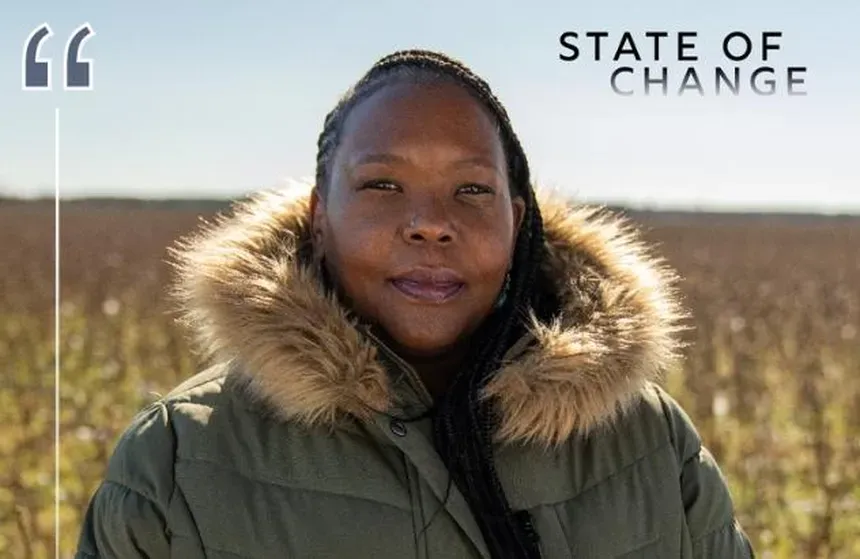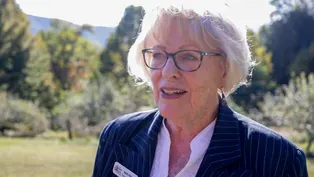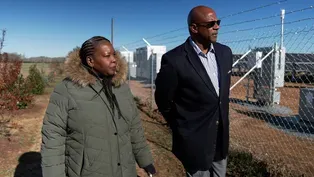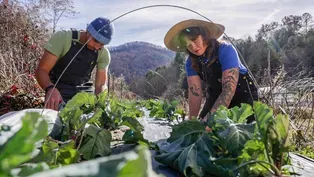
Utopian Seed Project: Rethinking Our Food System
Clip: Special | 10m 17sVideo has Closed Captions
The Utopian Seed Project works to build NC’s climate resiliency through crop diversity.
With climate change comes more weather extremes that threaten our vulnerable food system. Discover how the Utopian Seed Project in western North Carolina is building more climate resilience for North Carolina by selecting crop varieties adapted to our changing climate and introducing hardy tropical staples to farmers and chefs in the region.
State of Change is a local public television program presented by PBS NC
State of Change is part of the Pulitzer Center’s Connected Coastlines reporting initiative. For more information, go to https://pulitzercenter.org/connected-coastlines.

Utopian Seed Project: Rethinking Our Food System
Clip: Special | 10m 17sVideo has Closed Captions
With climate change comes more weather extremes that threaten our vulnerable food system. Discover how the Utopian Seed Project in western North Carolina is building more climate resilience for North Carolina by selecting crop varieties adapted to our changing climate and introducing hardy tropical staples to farmers and chefs in the region.
How to Watch State of Change
State of Change is available to stream on pbs.org and the free PBS App, available on iPhone, Apple TV, Android TV, Android smartphones, Amazon Fire TV, Amazon Fire Tablet, Roku, Samsung Smart TV, and Vizio.

Explore More from State of Change
Hear from North Carolinians about climate change effects & innovative solutions across the state.[gentle music] - There's a high level of unpredictability in farming at the moment and I fully believe and know that we need to like do everything we can to fight climate change in terms of mitigation strategies, but it would be foolish to think that we're not going somewhere a little bit more challenging and a little more climate chaotic in the very near future.
How do we adapt to that and how do we have a food system that's got a high amount of adaptive capacity to deal with some of these challenges that we're gonna face.
Everything comes back down to this concept of exploring diversity in the food environment system.
The Utopian Seed Project is a non-profit and we are about four years old.
I've been friends with a farmer Franny Tacey for quite some time and she's been super supportive since the get go to let us just use a part of her beautiful 27 acres.
We don't have a lot of space, we grow a lot of different things at small scale to kind of showcase them and then our hope is that we get them to farmers and farmers grow them at a big enough scale to feed the food system.
So, this is year three of selecting for collards that can survive extreme temperatures in the winter.
We started off with 21 heirloom varieties from a project called the Heirloom Collard Project and then that winter we noticed that some of them died when we had this real severe cold weather event and some of them survived.
And so, we decided that that's a good thing, if collards can survive unprotected with extreme weather.
Certainly with climate change on the way, on the way here.
- The thing that like catches people's eye at first is like the beautiful purple leaves.
There's also like the leaf texture and the leaf shape.
I'm kind of partial to the ones that are kinda super curly like this.
- That naturally existed in the collard populations.
That natural diversity where the plants were different and we're trying to encourage a bit more of that diversity coming in.
Basically, by taking two different varieties and letting them share pollen with each other.
It's kind of like having a baby, right?
You know, two different people have a baby, then the baby's gonna look different to the parents.
It might share some traits, but the baby's gonna be a little bit different.
And so, we're trying to do that with plants, like how do we get different plant babies so that we have more resilience within that food and farming system.
Basically, what we end up doing is growing a whole bunch of different varieties of crops that people recognize, but we also look at trying to increase the number of crops in the system.
So, like what crops could be grown here that aren't currently grown at any scale?
These big mother tubers are beautiful once you get down past the slime.
So, what we've got in this box is taro.
You can kind of see we pulled up the whole plant.
It's a really ancient food across the tropics, domesticated thousands and thousands of years ago.
It's a staple in lots of different cultures and the primary crop for us are these root crops here.
Anything you can do with a potato, you can do with taros, you can chip it, you can mash it, you can definitely fry it.
It's kinda like a starchy white fleshed tuber basically.
A lot of the tropicals they're like, the instant response is like, "I just didn't know you could grow that here."
And for the large part I think it's 'cause people have never asked the question.
So, the Utopian Seed Project sometimes it's just like open-minded curiosity, "Oh, that sounds cool, can we grow it here?"
And sometimes it's an epic fail, sometimes it's like marginal and we keep working with it and we need to find the right variety.
And some crops like taro we're like, "Oh wow, that grows really productively here, and really could have a place in the food system."
[people chittering] We got lots of farmers markets and farmers and that's fantastic, but then if we take one more step back from that, we're like where do those farmers get the seeds to grow that food?
Very, very little seed is grown at any scale in the southeast.
- People that are already like interested in local agriculture, it means a lot to them to go to their farmer's market and meet their farmer and it's like part of the system that's very close to home and I don't think that they understand that those seeds are coming from quite far away.
No matter how many local farmers you have, if you don't have local seed farmers then like there's this like weak foundation of the local food system.
- We're all engaged in food, because we have to eat.
So, whether we recognize it or not, we're part of our food system.
The two basic components of that food system is the supply, the farmers, and the demand, the consumers, but there's lots of other components.
We need to also have a supply chain for the seeds not just the food, because the farmer can grow the food, but they need the seeds to be able to grow the food.
So, how do we get more seeds into that system?
All these questions that I think are asked of the food system aren't asked of the seed system, but they are as important if not more important, because that seed is like, it's the genetic, cultural, tiny little miraculous package of information that informs everything that's gonna happen on the farm from that point forward.
- For farmers, if they're buying seed that is always coming from somewhere very far away, then those plants kind of like show up here in the south and it's like a very different climate.
I've been talking to more local seed savers and people that have kind of committed to saving their own seed on farm and a lot of them will like tell you that they see their yields go up a lot when they start saving their own seed.
I think year after year when the plant like knows where it's from, like it gives it like the chance to adapt to this place.
- As we set up the Utopian Seed Project, we quickly ran into this challenge where we didn't have the space or capacity to grow enough seed to support a regional farmer network.
- And that's kind of how the seed growers collective came about for there to be more seed growers in this area.
There's a couple barriers that they come up against.
Equipment is a really one.
There's a big difference between doing everything by hand and having like a few simple machines can help you scale up a lot.
It's also expertise.
Mostly, farmers learn from other farmers.
How did you process this?
How long did you need to let it dry?
A lot of the seed saving information that's out there is not necessarily like tailored super well for our region.
Sometimes we're like, "Oh, it gets really humid here, like really late in the season.
Do you think I can pull my like beans like way earlier than somebody else might?"
Just kind of having that conversation with other farmers around you like gives you the confidence to be able to do that.
Kind of puts the seed back in the farmer's hands a little bit.
- It's just like so much potential and beauty and diversity and flavor in the food system or well, not in the food system, there should be in the food system and isn't.
How do we get it out there?
How do we make farmers grow it and have chefs and consumers want it?
And some of it's literally just an awareness campaign.
And the challenge with agriculture is it kind of moves slowly and we have to shift everything at the same time, right?
We could easily persuade a farmer to grow taro, but if they don't have somebody to buy it, then they're not gonna grow it again, because they'll be annoyed at me.
[upbeat music] And we could easily persuade a chef and have that taro is delicious and they should have it on their menu.
But then their very first question is, where can I buy 50 pounds of this every week to put on my menu?
And we're like, oh, bugger, we've gotta go back to the farmers.
So, we're always doing this kind of juggling act.
- It's important for farmers to be able to reach the chefs directly.
It's good for our economy and it's good for our community, but I think what he's doing is challenging us, which is great.
Reintroducing or bringing new crops to us.
We're gonna make it enticing to the public, because we're gonna cook it, but he's already done the work to grow it, to bring it to us.
What's this Friday?
- We have Puerto Rican- - Okay.
- variety it grows bigger mothers.
- I'm gonna actually peel 'em and then slice it and then deep fry 'em, and see what happens.
See what happens, right?
My name is J. Chong pronouns are she/her?
I live here in Asheville, North Carolina.
I'm a private chef here.
My cuisine is Cantonese food.
So, it's very important for me to try to bring Cantonese cuisine, try to reintroduce it to Western North Carolina.
I made a sorghum congee, minced pork with some fresh taro in there, and today I'm gonna go ahead and slice some taro thin, deep fry it so we can have some nice chips on top.
Start with some chili oil here, some sorghum.
- We're doing work in the fields and I think that's really important, but when these crops and ingredients go through the hands of like a professional chef, then they just come out on the other end as like just magical creations.
- This is a yacon, it's a root vegetable, and it tastes a lot like a potato, but with apple, citrus, like fruit notes.
It's best baked like a dessert or made into a syrup or a powder, roasted.
Anything you can do with a sweet potato or an apple really.
[upbeat music] - [J. Chong] So good, y'all.
Oh my gosh.
- That grows in the ground.
- It does.
- It grows in the ground.
Ice cream's made from things you grew in the ground too.
- This is a root dessert.
It's awesome.
- Yeah, yeah.
- If we're gonna inspire people to change the way they interact with the food and farming system, then this is where it's at.
I can talk about climate resilience and farming techniques all day long, but all you need to do is taste this and go like, I wanna have sorghum and yacon in my diet every single day.
[gentle upbeat music] For us, what we think about is maybe in five years time, maybe in 10 years time, we could imagine a food system where some of these crops like taro or yacon are being grown by farmers, sold in farmer's markets, maybe they've made them into the co-ops.
Chefs are buying them, you see them on menus, people are sharing recipes on social media, and nobody even talks about the Utopian Seed Project.
Like once these crops are like autonomously adopted into the food system and just have a life of their own, then we can be like, we've done it.
Job good, let's move on to the next crop type of thing.
And that's what we're really trying to push towards.
Altapass Orchard: Conserving Land for Climate Resiliency
Video has Closed Captions
Land conservation is not a “one size fits all” solution. This orchard shows us one way. (7m 52s)
EnerWealth: Growing Solar Options in Rural Communities
Video has Closed Captions
EnerWealth works with rural farmers in NC to ensure they get a piece of the solar pie. (8m 12s)
Preview | State of Change: Seeds of Hope
Video has Closed Captions
Meet the North Carolinians who are adapting to climate change in new and inspiring ways. (30s)
Providing Support for PBS.org
Learn Moreabout PBS online sponsorshipState of Change is a local public television program presented by PBS NC
State of Change is part of the Pulitzer Center’s Connected Coastlines reporting initiative. For more information, go to https://pulitzercenter.org/connected-coastlines.














